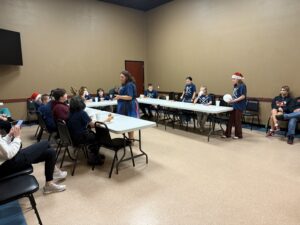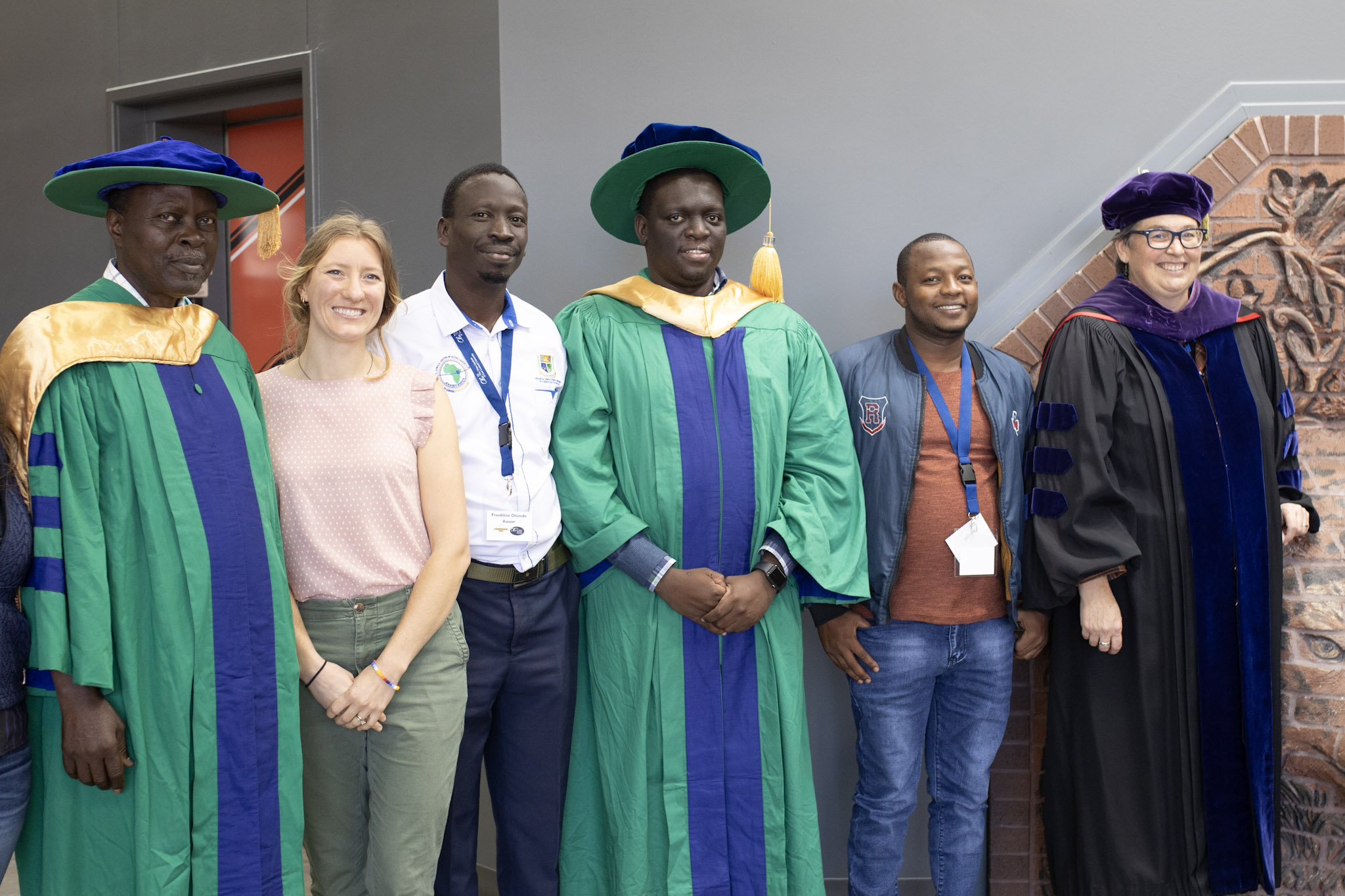
Global Collaborations in Water Policy: Ada, Oklahoma, Bondo, Kenya, and the World Beyond
December 1, 2023 by Jessika Leatherbury
By: Sunnie Dawn Baker
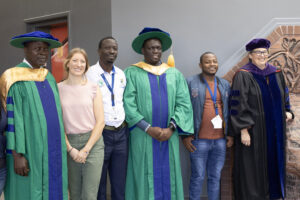 “There are many things that you can afford to go without, but the three things that we need for existence are water, food, and air,” Dr. Stephen Agong’ says pointedly. Agong’, a visiting professor at East Central University from the Jaramogi Oginga Odinga University of Science and Technology (JOOUST) in Bondo, Kenya, is passionate about all three of these things because he understands that they are the building blocks for continued human existence. He channels this passion into his work at ECU and the collaboration with the Oka’ Institute.
“There are many things that you can afford to go without, but the three things that we need for existence are water, food, and air,” Dr. Stephen Agong’ says pointedly. Agong’, a visiting professor at East Central University from the Jaramogi Oginga Odinga University of Science and Technology (JOOUST) in Bondo, Kenya, is passionate about all three of these things because he understands that they are the building blocks for continued human existence. He channels this passion into his work at ECU and the collaboration with the Oka’ Institute.
The relationship between the two institutions first began in 2018. Erick Ananga, a professor in the Politics, Law, and Society program at ECU mentioned to Dr. Christine Pappas, the Director of the Water Resource Policy and Management program at ECU, that they should visit Kenya, and he knew just the place. His brother, George, had been a researcher at JOOUST and he felt like their work and philosophy would align well with the work being done at ECU with water policy and management. Agong’, who held the position of the Vice Chancellor at JOOUST at the time, warmly invited a group of ECU professors and students to visit. This interaction fostered both friendships and a collaborative effort that prioritized integrated water resources policy and management in their work. It also brought about the 1st International Short Course on Integrate Water Resources Management to be undertaken jointly by both ECU and JOOUST students, which is now in its fourth cohort.
This course is significant for many reasons. It brings together students and faculty from both ECU and JOOUST to learn about water policy, management, and sustainability. For a week, these participants are immersed in learning about issues related to water and are challenged to find solutions. To solve the problems related to water, many viewpoints and skills are necessary. Some people need to be trained on the policy side, talking to legislators or drafting sustainable water policy. Others need to understand how to manage water to ensure a clean and sustainable supply. And yet another group needs to discover technological solutions that can advance water science that can lead to tech entrepreneurship.
One of the things that Agong’ found most exciting about the class was understanding all the different perspectives. There were 27 total participants in the course, 10 of which were visiting from Kenya. In the beginning, they were all asked to give their expectations. One student, a veteran, was interested in how water could be a global utility and be used to create an environment of peaceful coexistence between communities, essentially having water and food security leading to world peace. Another student was curious about how AI and other new technologies could be used to help with sustainable water practices.
While this short course provides an integrated approach to water resources management, this is only the beginning. While the first course and connection was in Kenya in 2018, the following year Agong’ along with twelve others came to Ada. Agong’ was amazed and inspired by the Oka’ Institute and made it his mission to do something similar in Kenya. One of the many commonalities between our communities is the accessibility to water. We have the Arbuckle- Simpson Aquifer. Bondo, Kenya, is located on Lake Victoria. When Agong’ returned home, he started developing the Global Pi Institute, giving rise to a blue economy research hub. Where Oka’ is the Chickasaw word for water, Pi is the Luo word for water. It is a beautiful 6 million dollar building which includes apartments for researchers and it is just waiting on more funding to equip the laboratory. The partnership between ECU, JOOUST, Oka’, and Pi could allow students to earn their Master’s in Water Policy and Management in Ada and then pursue their PhD studies in Kenya at JOOUST.
The sharing of knowledge between Ada and Bondo has the potential to revolutionize water research on a major scale, despite the fact that they are 9,000 miles apart. They are transforming their knowledge and experiences into something much larger than the individual community: the rural has become global. Even though there are differences between the communities—namely that many people in Kenya must travel as far as 20 kilometers to gather water for their homes—there are still many commonalities. Water is essential and vital to both communities and they also both have significant water sources to research. However, in order for these communities to thrive, these water sources must be protected and preserved.
These types of programs and facilities are essential to transforming our world into a Blue Economy. While the term “blue economy” has traditionally been used to refer to economic activities related to the oceans and seas, Agong’ sees the potential going even further: you must have water infrastructure to have growth. Essentially, water equals jobs. Everyone and everything needs water. Not only is it necessary for our survival, but it also plays a vital role in agriculture and manufacturing. While there are some specific jobs that can be created through water systems—both on the supply and the demand side—water is so integrated into our world that it is vital for every part of our world, and every job that is created.
Sign up to receive more news from the Ada Jobs Foundation HERE!
Written by
Jessika Leatherbury
You may also interested in:
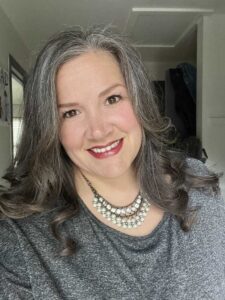
Adapt and Overcome: Allison Poe’s Recipe for Resilience and Growth
By: Sunnie Dawn Baker Allison Poe has always followed her feet. She waits for the signs to appear and, once she recognizes them, she travels that path, and has never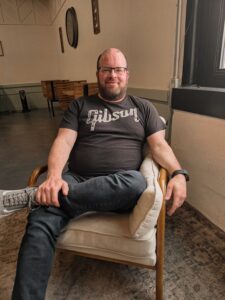
Jeff Warren: A Life in Sound, Vision, and Storytelling
By: Sunnie Dawn Baker When Jeff Warren got involved in the Houston music scene as a teenager, he had no clue where his path would lead. Now, nearly thirty years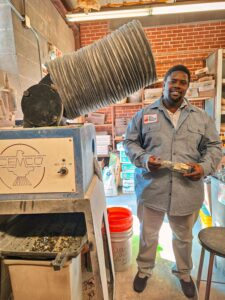
From Pitch to Progress: ECU's Glass Recycling Program Turns Waste into Opportunity
By: Sunnie Dawn Baker In 2018, Dr. Christine Pappas competed in Ada Jobs Foundation’s Big Pitch Competition by promoting grinding glass bottles into sand. She won the Big Pitch that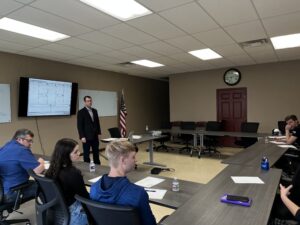
The Importance of Customer Discovery: Know Your Audience and Know Your Market
By: Sunnie Dawn Baker Entrepreneurs and small business owners must consider many factors to achieve success, with their target market being one of the most crucial. Sometimes, when people are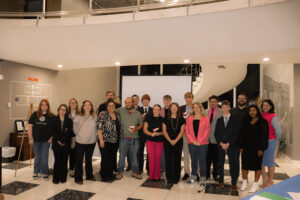
What Does Economic Development Do for You? The Significance of the Economic Multiplier
By: Sunnie Dawn Baker People often find the term “economic development” vague and confusing. Understanding how economic development works and benefits the community can be challenging. Though there are many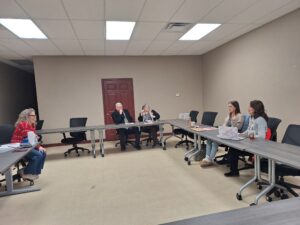
Helping Entrepreneurs One Workshop at a Time: Lauri Rowe and QuickBooks for Small Businesses
Entrepreneurs tend to be filled with passion and big ideas. They have found a solution to a problem they see in the world, and they barrel ahead, excited for their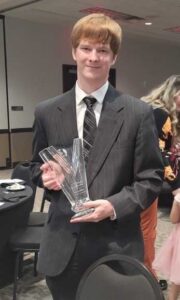
Hunter Cook: Technology, Entrepreneurship, and the Written Word
By: Sunnie Dawn Baker Hunter Cook started writing when he was seven years old. At first, he wanted to write comic books, but then he realized he couldn’t draw. He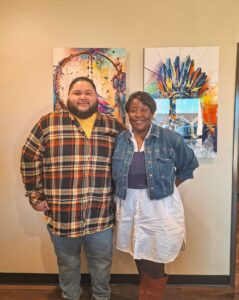
Empowering Native Artists: FAME App Brings Innovation to First American E-Commerce
By: Sunnie Dawn Baker Entrepreneurs are problem solvers. They are constantly striving for solutions to issues they see in the world or in their own lives. In the case of
Learn, Connect, and Grow: 2025 Workshops for Aspiring and Current Business Owners
By: Sunnie Dawn Baker A new year brings new possibilities, and, at the Ada Jobs Foundation, it also brings a new round of programming and workshops. As the local Economic